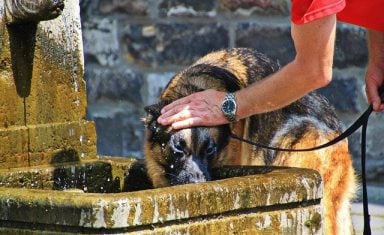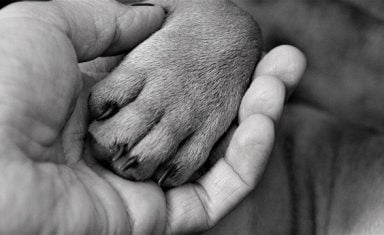Has your dog suddenly begun squinting, but only on one side? This is probably not a wink of affection. It may have developed an open sore on the clear protective layer covering its eye. These types of wounds are called corneal ulcers, and are a very common cause for squinting and discomfort in dogs.
How did my dog get a wound on its eye?
A corneal ulcer may come after an acute traumatic event (for example, a cat claw to the eye) scratches the surface of the eye, or when dogs have canine dry eye, also known as keratoconjunctivitis sicca. The ulcer develops when the scratching or rubbing causes a loss of the corneal epithelial cells that protect the front surface of the eye.
Does a corneal ulceration hurt?
In humans, even dealing with an eyelash on the surface of our eye can be extremely irritating so you can imagine that once an ulcer develops, it is very painful in our pets. A corneal ulcer can lead to additional problems such as infection, cloudiness, loss of vision or even rupture.
How to diagnose a corneal ulcer
Often dogs will develop goopy discharge, squinting and redness in the eye with an ulcer. In order to medically diagnose a corneal ulcer, however, we use a few drops of a fluorescein dye. We deposit the dye into the eye and then shine UV light on the lens. A healthy, intact cornea will not absorb the dye. Any ulcerated regions will take the dye up and shine bright green under the UV light.
How veterinarians treat an ulcer in your dog’s eye
We often send home antibiotic drops or ointments to prevent secondary infection and speed healing. We also have additional drops which can help repair the ulcerated site.
Because the cornea doesn’t have its own direct blood supply, providing nutrients to the eye is pivotal. One treatment option involves collecting a blood sample, spinning it down and preparing serum from the patient themselves. The serum can be applied directly to the eye and contains plenty of growth stimulators which can help heal the surface of the eye even faster.
How quickly will my dog recover?
In general, dogs that experience a superficial corneal ulcer will heal very quickly with appropriate treatment and management. Dogs often respond very well to treatment and tend to feel a lot better in 3-5 days. Occasionally, certain breeds of dogs will develop ulcers that don’t heal within 7 days and require additional workup and treatment.
If your dog or cat develops a red or squinty eye, call a vet immediately to alleviate the pain of a corneal ulcer and protect their vision! If you live in Charlottesville, call VETSS for emergency care.
– Dr. Wasi Ashraf
For more information, contact our team at VETSS, a Charlottesville VA urgent care animal hospital!




